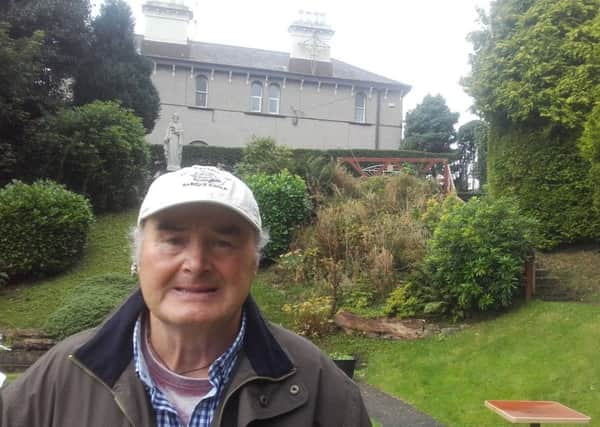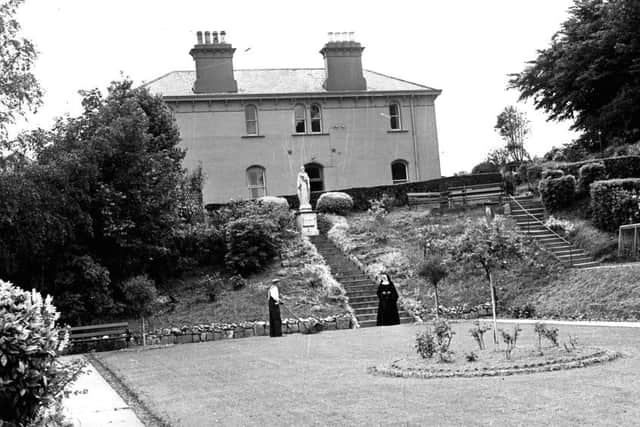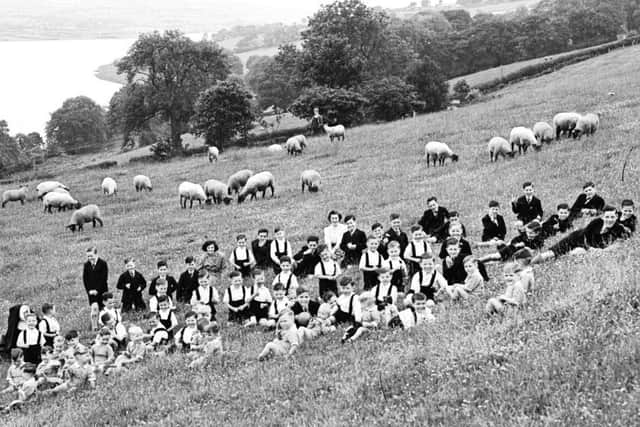'˜You were always afraid'


Patrick was brought to St. Joseph’s Boys Home in Derry at the age of five and over the next eight years he suffered repeated violent attacks as well as episodes of sexual abuse at the hands of a gang of older boys.
The attacks and his experiences at Termonbacca have had life-long repercussions.
Advertisement
Hide AdAdvertisement
Hide AdNow almost 73 years of age, the Donegal native has chosen to speak publicly for the first time about what he and others endured, following the findings of the Historical Abuse Inquiry team.


The Inquiry’s report, published last Friday, catalogued disturbing sexual, physical and emotional abuse perpetrated against young boys and girls in Derry’s children’s homes over several decades.
Despite denials by some surviving Sisters of Nazareth, the Inquiry found that due to inadequate numbers and lack of State support, the Sisters in Derry allowed older children to take over the supervision of younger children when they were otherwise engaged, creating a situation which had disastrous and tragic consequences.
Patrick O’Rourke was born in Donegal and has vivid memories of being brought to Termonbacca by his mother in the Spring of 1949.
Advertisement
Hide AdAdvertisement
Hide Ad“The way we went into Termonbacca, the entrance is different today. We came up steps from the Letterkenny Road. There was a gate in the wall.


“My mother was taking me by the hand. I noticed the tears were dropping. She was a young woman in her 20’s. I was born when she was 18.
“I cried a lot going up the steps and I saw my mother crying and, of course, that was an omen that something was wrong.
“I went into this place and that was the first time I ever got a phobia about doors, they were all closed. I knew then that I was going to be left behind. I remember the door bang; doors closing.”
Advertisement
Hide AdAdvertisement
Hide AdPatrick said his parents were “good people and very much loved”.


“They just became ill,” he said. “My mother would have suffered from depression; my father’s health broke down. What was amazing about that was that they never recovered from their circumstances. What happened me and my family could have happened anybody, but society wasn’t prepared to see it that way.
“They left that town not long after that. Now there’s good people there, nothing against them, but they left lock, stock and barrel. For a while they were drifting into homelessness. They would have been living in wild places.”
Patrick said he appreciated that the situation surrounding the children’s home was a complex one.
Advertisement
Hide AdAdvertisement
Hide AdSpeaking about the conditions and the Sisters of Nazareth who ran it, he said: “There were a lot of boys, I don’t think the British Government was throwing money at them.


“They went door-to-door for us. I can see things from many, many dimensions. They, in a way, were suffering themselves.”
He added, however, that the children there were brought up in an atmosphere of “coldness” and that “if you ever showed any confidence it seemed like you were kept down every time.”
Patrick was subjected to frequent and sustained physical assaults at the hands of the older boys, as well as being subjected to traumatic sexual attacks on a number of occasions. The threat of physical violence was a daily reality and he still bears the scars on his hands, including an injury to his thumb that never healed and a scar on his chin after being thrown against a radiator. He said others fared even worse.
Advertisement
Hide AdAdvertisement
Hide Ad“You were always afraid,” he noted. “Of the older boys, I was terrified. You can see my injuries today. They had these old radiators with ribs and they were sharp.
“For all my life I’ve lived in fear; you’re afraid; you’d swear you’d killed someone.
“We grew up in Nissen style metal places. The main building was where the nuns stayed. There was a dormitory and a lot of boys. We had the basics. But I was always afraid.”
Patrick said if his parents came to visit unannounced there would be “uproar.”
Advertisement
Hide AdAdvertisement
Hide AdHe also remembered the severe itching caused by Jeyes Fluid being added to bath water by the Sisters, a practise the Inquiry team raised grave concerns about.
“At one time I gulped that and then at bath time I would get afraid and that brought on a lot of nose bleeds. To this very day I see this [Jeyes Fluid] around me . . . ,” Patrick said.
Many events inside the home have left a deep impression on Patrick.
His first experience of death involved a little boy who died in the mid-1950s of natural causes.
Advertisement
Hide AdAdvertisement
Hide AdHe recalls: “Michael Mulholland, God rest his soul. We thought he was sleeping in his coffin. He looked like he was smiling. We thought he was just having a rest until the Sister called us and she put the lid on and said, ‘Michael is going away now’. That was a sad moment. I always think of the Seamus Heaney poem about his brother [Mid-Term Break], the ‘four foot box, a foot for every year’. Whenever I think of Michael I think ‘a two foot box, inches for every year’.”
Despite his own repeated traumas growing up, Patrick said that the thing that haunts him most about Termonbacca was what happened to some of the other children.
“The British Government had an orphanage scheme. They would clear out the orphanages every so often and would send them to Australia.
“I always remember the little boys on a long seat outside the main building in Termonbacca and the khaki bags - they were blue - they were nearly as big as the boys.
Advertisement
Hide AdAdvertisement
Hide Ad“We didn’t know at the time they were going on a 14,000 mile trip on rickety old boats and I remember that night, if you can imagine an orphanage, there was this silence. The place was empty. I said to one of the Sisters, ‘where do the boys go?’ And she pulled me aside and said ‘don’t you ever ask any questions like that again,’ so we never knew.
“I believe there were around 100 who left. Years later I saw a picture in a Sunday paper and I became upset. It showed you them outside the main building.
“The reason we weren’t sent was because we had parents and were from another jurisdiction.”
One of the major concerns highlighted in the Inquiry’s Report was that the children were never told they had siblings who were also housed in institutions, something which was to have a devastating effect on many families.
Patrick questioned how that was allowed to happen.
Advertisement
Hide AdAdvertisement
Hide AdFor all he went through, Patrick said that there were also some light-hearted moments.
“I was the messenger boy at Termonbacca later and on the 12th of July I was sent out for a message and they’d be up in Ferryquay Street and they’d be eating these big cones of ice cream. It was a warm day and I’d no money. When you are small everybody’s big and I looked up at these two huge men with their hats, and they held their cones in their hands. And they looked down at me and one of them said to the other guy ‘aw here get that wee fella an ice cream.’ And he gave me a half crown.
“I also went to Bishop Neil Farren’s house every Friday with a little basket of poultry eggs.”
He said he always remembers the people of Derry with great fondness. At Christmasgroups from outside would bring in toys and there were sometimes day trips away on a bus organised.
Advertisement
Hide AdAdvertisement
Hide AdYet the trauma of being institutionalised and his experiences of abuse and loneliness would leave Patrick deeply troubled.
The Reverend Mother at Termonbacca had, in fact, raised concerns over what would happen to the family in a meeting with his parents.
Depression has been a constant shadow that followed him through into adulthood. However there were others who suffered worse in the home, particularly those who had no parents.
Since the Inquiry delivered its findings, Patrick said his thoughts were very much with all those who have suffered.
Advertisement
Hide AdAdvertisement
Hide Ad“The truth has come out at last and it has been a long, long, lonely journey,” he maintained.
“People like us have given society a great insight and society will gain enormously by this if it never happens again.
“I’ll be 73 next month and when we are gone, society will be a much better place and it won’t be all in vain.”
*In next Tuesday’s ‘Journal’ Patrick speaks about leaving Termonbacca, returning home to find his parents living in extreme conditions; his career and the impact of depression. He also speaks about the way in which those who had been institutionalised have been treated, the impact of the abuse probes north and south and why he feels it is so vital that people talk about depression and do not try to overcome the illness on their own.
See more on HIA Inquiry findings: www.derryjournal.com/news/crime/children-were-sexually-abused-beaten-humiliated-and-lived-in-fear-1-7787619